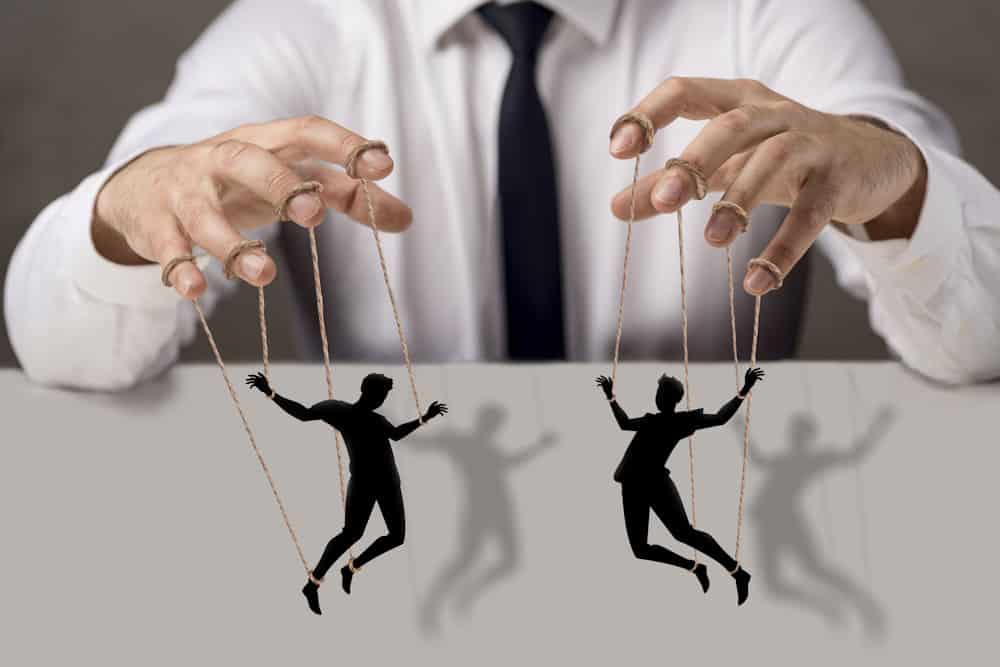Why Do Narcissists Always Play the Victim?
*We may earn a commission for purchases made using our links. Please see our disclosure to learn more.
Narcissists are people who seem to believe they are superior to others around them. In reality, that arrogance is often masking a deep-seated sense of insecurity, shame, and self-loathing. Given this internal chaos, they will often play the victim.
The narcissist plays the victim to protect their genuinely fragile self-esteem, justify their toxic behavior, and prevent others from seeing what they believe to be the truth about themselves. In other words, they play the victim because they’re terrified you’ll see them for what they really are.
Narcissists use their victim mentality to get away with some very abusive behavior. That’s why it’s vital to understand what they’re really doing when they cry foul. Let’s explore further the reasons behind this behavior.
Why Do Narcissists Play the Victim?

Narcissists are individuals who have a grandiose sense of self-importance and a lack of empathy towards others. They always crave attention and admiration and will go to any lengths to get what they want. While they may seem confident and self-assured on the outside, they are often hiding deep insecurities and a fragile ego.
One common manipulation tactic used by narcissists is to play the victim. They will often use a victim mentality to control others, justify their toxic behavior, and make others feel sorry for them.
Researchers in psychology at several prominent universities in the United States say that narcissistic traits, particularly the traits of entitlement, are the reason for their victimhood. In their study, the experts found a positive correlation between levels of narcissism and the reported number of transgressions committed against them.
This kind of manipulation can be a challenging and exhausting experience for those around them. Let’s look more closely at just why they do it.
To Avoid Taking Responsibility
Narcissists play the victim for a variety of reasons. One of the primary reasons they do so is to avoid taking responsibility for their actions. Instead of admitting fault or apologizing, they will shift the blame onto others and make themselves out to be the innocent victim.
This can be particularly damaging in abusive relationships, where the narcissist may use the victim card to justify their abuse. You can learn more about how to deal with blame-shifting in this video.
For Narcissistic Supply
Another reason why narcissists play the victim is that it provides them with a source of narcissistic supply. When others feel sorry for them, the narcissist receives validation and attention, which feeds their ego and makes them feel important. This is particularly true if the narcissist has an inflated sense of self-importance and feels entitled to special treatment.
For Power and Control

Playing the victim also allows narcissists to maintain their sense of control and power over others. By positioning themselves as the victim, they can manipulate others into seeing them as the innocent party. This can be a useful defense mechanism for them, especially if they are feeling threatened or exposed.
Overall, narcissists play the victim because it benefits them in some way. However, it is essential to remember that the victim role is often a façade used to manipulate others and maintain their sense of entitlement. It can be challenging for victims to challenge this narrative and hold narcissists accountable for their actions. Still, setting and enforcing boundaries in relationships is crucial to protect oneself and prevent further harm.
How Can You Spot the Victim Mentality in Narcissism?

Dealing with narcissistic behavior can be a challenge, especially when the individual you’re dealing with exhibits a victim mentality. Often, narcissists play the victim card to manipulate others into giving them special treatment or to evade accountability for their toxic or abusive behavior. Here are some signs that you’re dealing with a narcissist who has a victim mentality:
1. Lack of Empathy
Narcissists often have a grandiose sense of self and a strong sense of entitlement. They lack emotional empathy for others and cannot see beyond their own needs and desires. They may use their victim narrative as an excuse to mistreat, lie to, or manipulate others.
2. Blame-Shifting
When confronted with their toxic behavior, narcissists often play the victim card and try to shift the blame onto others. They may deny responsibility for their actions and make it seem like everyone else is at fault.
3. Refusing to Acknowledge Boundaries
Narcissists with a victim mentality may not respect your boundaries in a romantic or even a professional relationship. They may demand special treatment and make you feel like you’re not doing enough for them.
4. Gaslighting and Manipulation
Narcissists with a victim mentality may use gaslighting and manipulation tactics to make you doubt your sense of reality. They may try to convince you that you’re the one in the wrong, even when they’re the guilty party. This video gives you some useful ways to handle gaslighting from a narcissistic mother.
5. Exaggerating or Inventing Tales of Woe
Narcissists with a victim mentality often have an all-encompassing sense of victimization. They may exaggerate or invent stories of abuse or hardship to gain sympathy and attention.
If you’re in a relationship with a narcissist, seek help from a therapist or counselor who is experienced in dealing with personality disorders. Remember, it’s not your responsibility to fix the narcissist’s self-esteem issues or provide them with constant narcissistic supply. Take care of yourself, and don’t let the narcissist’s airtight victim narrative control your life.
What are Some Things a Narcissist Playing the Victim Will Say?

Narcissists are known for their manipulative behavior, and one of the tactics they often use to gain sympathy and control over others is playing the victim. While there are many different ways a narcissist may play the victim, there are certain phrases or statements that tend to be common among them. Here are some of the things a narcissist playing the victim will likely say.
| Common Phrases the Narcissistic Victim Will Use |
1. “You’re misunderstanding me”When called out on their behavior, a narcissistic victim will often try to deflect blame by suggesting that others are misunderstanding them. They may try to twist the situation around to make it seem as though they are the innocent party who has been wrongly accused. |
2. “I’m the real victim here”This is a classic line used by narcissists playing the victim. They may try to paint themselves as the true victim in a situation, even if they were actually the ones who caused harm or hurt others. |
3. “I’m just trying to help you”Narcissists may use the guise of helping others as a way to gain control over them. They may use this statement to make it seem as though they are doing something good, while in reality, they are just trying to manipulate and control. |
4. “You’re being too emotional”Narcissists often try to dismiss the emotions of others as a way to deflect criticism. They may paint their victims as overly sensitive or emotional, which then makes it easier for them to dismiss valid concerns. |
5. “You’re trying to make me look bad”When called out on their behavior, narcissists may try to turn the situation around by accusing others of trying to make them look bad. This is another way for them to deflect blame and avoid taking responsibility for their actions. |
While these phrases may sound innocent at first, they are often used by narcissists as a way to manipulate and control others. It’s important to be aware of these tactics and to avoid falling into their trap.
How Do Narcissistic Traits Create/Maintain a Victim Mentality?

Narcissistic Personality Disorder is a complex disorder that is characterized by a grandiose sense of self-importance, a lack of empathy, and a need for constant admiration and attention. People with narcissistic traits often exhibit manipulative behavior to maintain their false sense of superiority.
Sometimes, playing the victim can help them do that. Here are some ways their traits contribute to the victim mentality.
Grandiose Sense of Self-Importance
One of the defining characteristics of narcissistic personality disorder is a grandiose sense of self-importance. This trait is a core component of the disorder, and it underpins many of the narcissist’s attitudes and behaviors.
People with narcissistic personality disorder believe that they are inherently superior to others. They often have an inflated sense of their own abilities and accomplishments, and they may talk about themselves in grandiose terms. They believe that they are entitled to special treatment, and they may demand attention, praise, and admiration from others.
This sense of superiority can be seen in many areas of the narcissist’s life. They may believe that they are uniquely talented or gifted in certain areas, and they may be dismissive of those who lack their abilities or talents. They may also believe that they are uniquely deserving of success and recognition, and they may be unwilling to accept feedback or criticism that suggests otherwise.
The grandiose sense of self-importance is also reflected in the narcissist’s attitudes towards others. They may see other people as inferior or unworthy of their attention, and they may be dismissive of their needs and feelings. They may also be exploitative towards others, using them for their own gain without regard for their well-being.
This trait can make it difficult for narcissists to form close and meaningful relationships with others. Their need for special treatment and adoration can be overwhelming, and their lack of empathy and concern for others can be off-putting. They may also struggle with boundaries in relationships, as they may see others as extensions of themselves rather than individuals with their own needs and desires.
Lack of Empathy and Ability to Manipulate Others
Narcissists often use their lack of empathy to exploit the empathy of others, often casting themselves as the innocent victim in any given situation. This can be a powerful manipulation tactic, as it can make those around them feel guilty or responsible for their pain. By playing the victim, narcissists can avoid taking responsibility for their own actions or behaviors and can manipulate others into doing their bidding.
Narcissists also may use their lack of empathy to engage in abusive or toxic behaviors in relationships. They may see their partners or family members as extensions of themselves rather than individuals with their own needs and desires. This can lead to them engaging in controlling or manipulative behaviors, such as gaslighting, emotional abuse, or other forms of toxic behavior.
Overall, the lack of empathy and the ability to manipulate others are two of the most challenging traits of narcissistic personality disorder. These traits can make it difficult for narcissists to form genuine connections with others and can lead to them engaging in toxic or abusive behaviors in relationships.
They also use these traits to cast themselves in the role of the victim. They are then able to convince others around them that they have been wronged and should be pitied or treated in a special way.
Strong Sense of Entitlement and Expectation for Special Treatment
One of the most defining traits of a narcissistic personality is a strong sense of entitlement and expectation for special treatment. This can manifest in a variety of ways, from demanding special favors from friends and family to insisting on receiving preferential treatment in the workplace.
For many narcissists, this sense of entitlement stems from a delusional sense of grandiosity and superiority. They may see themselves as uniquely talented or gifted and therefore believe that they deserve special treatment and recognition for their accomplishments. They may become angry or resentful when they feel that others are not giving them the respect or admiration that they believe they are entitled to, and in this way, they can play the victim.
This expectation for special treatment can also extend to their relationships. Narcissists may expect their partners to cater to their every whim and desire and may become upset when they don’t receive the level of attention or adoration that they believe they deserve. They may also become manipulative and controlling, using tactics such as guilt-tripping to get their way.
It’s important to note that this sense of entitlement and expectation for special treatment is not simply a personality quirk but a symptom of a larger personality disorder. Narcissistic behavior is often rooted in deep-seated feelings of insecurity and low self-esteem and can have devastating effects on both the narcissist and those around them.
Inflated Sense of Self-Worth and Need for Narcissistic Supply
One of the defining traits of narcissistic personality disorder is an inflated sense of self-worth. Narcissists view themselves as special or superior compared to others around them and exhibit a strong need for admiration and recognition. This sense of superiority often manifests in a grandiose sense of self-importance, an over-exaggerated view of one’s abilities and talents, and a belief that they are entitled to special treatment and privileges.
Narcissists thrive on receiving attention and admiration from those around them, and this is where the need for narcissistic supply comes into play. Narcissistic supply refers to any form of attention, praise, or validation that the narcissist receives from others that feeds their ego and boosts their self-esteem. Narcissists use various manipulative tactics and behaviors to elicit this supply from those around them, including playing the victim, gaslighting, and love-bombing.
The need for narcissistic supply is not simply a desire for attention; it is a deep-seated need that drives the narcissist’s behavior and shapes their interactions with others. Much like an addiction, the need for narcissistic supply can become all-consuming, leading the narcissist to engage in increasingly toxic and damaging behaviors to maintain their sense of superiority and control.
Narcissists often demand a level of attention and admiration that is unsustainable and can leave their partners feeling drained and emotionally depleted. Establishing boundaries and learning to identify and avoid manipulation tactics is crucial in maintaining a healthy relationship with a narcissist.
What is the Narcissistic Victim Syndrome?
In some cases, victims of narcissistic abuse can develop a condition called Narcissistic Victim Syndrome. This is a condition where the victim becomes trapped in an airtight victim narrative, which perpetuates their sense of victimization, as this video explains.
They may struggle to break free from the narcissist’s control and may even defend their abuser’s behavior. Narcissists use this mentality as a manipulation tactic to deflect blame and maintain their sense of superiority.
It is important for victims to recognize the signs of narcissistic behavior and set clear boundaries in relationships. By understanding how narcissists use the victim mentality, victims can take steps to protect themselves from emotional and psychological abuse.
What are the Signs of Narcissistic Victim Syndrome?

Narcissistic Personality Disorder (NPD) is a complex disorder that affects millions of people worldwide. One key aspect of NPD is the tendency for those with this condition to play the victim. This phenomenon is known as Narcissistic Victim Syndrome or Narcissistic Abuse Syndrome.
If you suspect that you or someone you know may be suffering from Narcissistic Victim Syndrome, there are several crucial signs to look out for.
| Signs of Narcissistic Victim Syndrome |
Classic Symptoms of Emotional and Physical AbuseVictims of NPD often display classic symptoms of emotional and physical abuse. They may experience anxiety, depression, PTSD, and other psychological symptoms. Additionally, victims may feel a great deal of shame, guilt, and blame for the abuse they have suffered. |
Sense of Isolation and LonelinessAnother key symptom of Narcissistic Victim Syndrome is an overwhelming sense of isolation and loneliness. Those trapped in abusive relationships and under the spell of a narcissist often feel that they are alone in the world, even when surrounded by friends and loved ones. They may perceive their abusers as all-powerful, all-knowing beings and themselves as weak and helpless. |
Heightened SensitivityVictims of NPD may also display heightened sensitivity to external factors such as criticism and feedback. This is because narcissists are often highly defensive and prone to cranky outbursts or rage when their behavior is questioned. Victims may feel like they are walking on eggshells around their abusers, always trying to avoid confrontation or conflict. |
Sense of Being TrappedUltimately, the hallmark of Narcissistic Victim Syndrome is a sense of being trapped in a cycle of abuse that is almost impossible to escape. Those who suffer from NVP may feel powerless, helpless, and without hope for the future. However, by identifying these symptoms and seeking help from a trusted therapist or counselor, victims can begin to break this cycle of abuse and begin their journey toward healing. |
How Can You Push Back Against the Narcissistic Victim?

Dealing with a narcissistic victim can be a challenge, as they often use their victim mentality to manipulate and control others. They may use their perceived suffering as a way to elicit sympathy and attention or to deflect responsibility for their own actions.
If you find yourself in a situation with a narcissistic victim, there are a few effective ways to push back and regain control of the situation.
Set Explicit Limits
Firstly, it’s important to establish clear boundaries and assert your own needs. Narcissistic victims tend to have an all-encompassing sense of entitlement, which can make it difficult for them to accept any limits on their behavior or expectations. Be firm but respectful in setting your own boundaries and expectations, and don’t allow the narcissistic victim to infringe upon them.
Challenge the Victim Narrative
Another useful tactic is to challenge their victim narrative. Narcissistic victims often have a distorted sense of reality and may exaggerate or fabricate their own hardships to garner sympathy. Use facts and evidence to question their version of events and encourage them to take responsibility for their own actions.
No Coddling
It’s also important to resist the urge to provide constant validation or coddling. Narcissists need a steady stream of attention and admiration to maintain their sense of superiority and control. By refusing to provide this validation, you can weaken their hold over you and encourage them to seek it out elsewhere.
Get Help
Finally, it can be helpful to seek support and guidance from a therapist or other mental health professional. Dealing with a narcissistic victim can be emotionally draining and complex, and having an outside perspective and tools to manage your own reactions can be invaluable.
Final Thoughts
Narcissists will use their victim mentality to get away with abusive behavior and trap their own victims into a cycle of abuse. It’s valuable to understand what they’re doing so that you can push back against this kind of manipulation.
By setting strong boundaries, challenging their victim narrative, and getting help for the problems it causes, you can effectively push back against the narcissistic victim. If you don’t take those steps, however, you could easily end up trapped in a cycle of abuse.
--
If you want more tips for dealing with narcissists, setting boundaries, and managing emotional triggers, make sure you subscribe to my youtube channel




